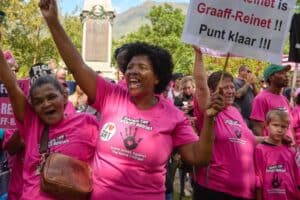Damage inflicted in less than a week of riots could take more than 20 years or more to repair, and many businesses might never recover.

With over R16-billion worth of loss and destruction, 40 000 businesses affected and over 129 000 jobs lost due to riots in eThekwini, Kwazulu-Natal, alone, economists estimate it could take up to 20 years for South Africa to recover from the ongoing spate of looting and destruction.
And, if peace isn’t restored immediately, this recovery time could be stretched even longer, meaning even worse poverty and inequality in the future, eThekwini Mayor Mxolisi Kaunda said on Wednesday.
Kaunda said a large portion of the 5 000 severely affected informal traders and 40 000 formal business, including small businesses, “may never recover from this upheaval”.
3000 people hurt by a single factory’s looting
In Isithebe, in the province’s Ilembe district, a brand new clothing factory, Kingspark Manufacturers, set up only last September, has been completely destroyed. Machinery and raw materials looted.
Due to this incident alone, according to the Southern African Clothing and Textile Workers’ Union (Sactwu), 600 much-needed jobs supporting 3 000 family members in the poorest part of the country were lost.
Socio-economic analysts Solly Masilela said this was the intention of the instigators and those who stand to gain from the chaos; destroying the economy and collapsing the state.
He said, however, that the plan largely failed, thanks to no-nonsense communities, who have in the spectacular failure of law enforcement agencies, emerged as heroes for stopping the destruction from spreading across the country as intended.
Communities defending their own
After the SA National Defense Force was deployed to Gauteng and KwaZulu-Natal this week, communities bordering those provinces moved to protect their malls in anticipation that the looters will move into their unprotected towns.
In Mpumalanga a group of people intent on burning down Kwagga Plaza in Kwaggafontein were assaulted and chased off but they managed to burn a bus at the intersection.
Twice on Tuesday, the community of Atteridgeville, West of Pretoria, clashed with a group intending to break into the Nkomo Village Mall in extension six.
Kallie Kriel, Afrikaner interest group AfriForum’s chief executive, said organised communities need not fear but calmed by the knowledge that their safety was in their own hands.
“…AfriForum has invested a great deal of resources in the establishment of community safety structures and already runs 159 neighbourhood watches, has a network of control rooms, a nationwide radio network, 12 500 neighbourhood watch volunteers, an air wing with 53 drone pilots and well-trained staff and volunteers,” he said.
Protect, but stay within the law
But Masilela warned that this community action could lead to deadly skirmishes with those intent on looting, and that law enforcement agencies should ensure such confrontations are averted.
“Law enforcement agencies must assist communities in stopping the looting from spreading. Here we have a situation where the communities managed to read the situation and acted accordingly, something that law enforcement agencies failed to do. So now police must ensure that there is no violent confrontation between looters and communities,” he said.
On Wednesday 13-year-old Vusi Dlamini was shot and killed during a skirmish between taxi drivers and a mob of looters trying to burn down Vosloorus Mall on Gauteng’s East Rand, with a body of a looter found behind the mall.
The riots, which have left 72 people dead, is fast creating a humanitarian crisis, with Doctors Without Borders concerned with disruption of crucial healthcare services, access to food and other essentials.
The international medical humanitarian organisation lamented that healthcare staff could not get to work due to public transport stoppages, road closures and the suspension of private ambulance services.
The experiences of the organisation’s staff indicate the violent unrest was characterised by a blatant disregard for the basic sanctity of health facilities and medical staff. [email protected]
Support Local Journalism
Add The Citizen as a Preferred Source on Google and follow us on Google News to see more of our trusted reporting in Google News and Top Stories.






